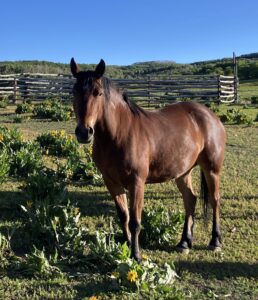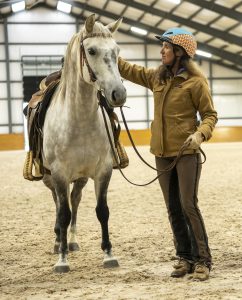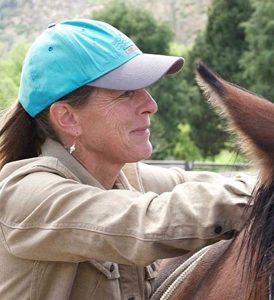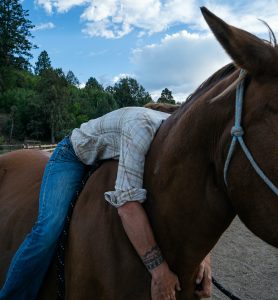Listen to Episode 5 of our podcast
Horses present a mental health paradox.
 There’s no doubt horses make us feel better. Their size, their beauty, their behavior, their energy demands that we be present, that we focus on them and what we’re doing around them. This being present makes us feel better. It’s good to get out of our heads. We can feel them around us, or, if we’re riding, beneath us. We can smell them and watch and feel how athletically they move.
There’s no doubt horses make us feel better. Their size, their beauty, their behavior, their energy demands that we be present, that we focus on them and what we’re doing around them. This being present makes us feel better. It’s good to get out of our heads. We can feel them around us, or, if we’re riding, beneath us. We can smell them and watch and feel how athletically they move.
That dose of being present and of our focused interaction with a beautiful creature, even if it’s just for a few moments, can have positive impacts on our days and our lives. So there’s that.
But too often I hear horse folks telling me a version of “horses are my therapy.” As if horse owners didn’t need to do any more work on their well being or self awareness. As if, with the riding and hay tossing and water-trough filling, horse owners were inoculated against mental health woes.
Also, let’s not forget the two-way nature of our interactions. What impacts are we having on our horses?
Yes, horses help us with being present and this is time well spent.
Yes, horses help us heal from myriad traumas and troubles by centering our focus on the moment.
Yes, spending time with horses helps us set aside, even temporarily, our struggles.

Katrin Silva at the BHPS 2021 Summit
But the reality is that the mental health journey, the trials of getting to a better place is usually a lot more pro-active than simply hanging out with horses and riding. It’s a deliberate road we choose and it often involves counseling – actual therapy with a professional. It might also involve listening to podcasts, having frank conversations with people you trust and respect, reading books, meditation, and checking your substance use. It involves being vulnerable about past transgressions and learning how to be more accountable for your actions. It might include changing the way we do things – like how we deal with confrontations or how we handle intimate relationships. It will almost certainly involve considering and reconsidering our childhood and family dynamics. It involves identifying patterns – healthy and unhealthy ones that have gotten us to where we are now as adults. These patterns might be physical (like not getting exercise or overexercising), or lifestyle (like having a glass of wine after work or having the whole bottle), or of reactions (like, how you respond to a minor confrontation with a stranger) or internal reactions (like, where your mind goes when a friend cancels dinner plans).
Jec and I believe that being well has something to do with best horse practices. We also believe that the horse world, the cowboy world, the clinician world can be tough environments for being open and active about mental health. It can be isolating and culturally, there is not a lot of space for vulnerable conversations.
But being aware of and working on our stuff, will, we think, can potentially improve our horse-rider partnership. It may not be developing a horse who can perform flying changes. And it’s not teaching a horse to help you open and close gates quickly and efficiently. But your wellness – physical, mental, and emotional – is this overarching element in the horse-rider equation.

Maddy Butcher. PC: Beau Gaughran
I’m going to share some thoughts, to show one horse person with struggles, to offer up an example in hopes that readers might benefit from hearing them and maybe come forward, to offer their two cents and their journeys.
I have anxiety. Technically, it is called Generalized Anxiety Disorder, according to folks who like to put a name to things. And being an anxious, thinking sort, I don’t know if the label has helped or hindered.
It might have started about 20 years ago. A friend was taking care of my young sons and I was getting away for the first time ever. As in, my sons (ages 7, 9, 11) and I had never been apart for more than 24 hours and here I was flying across the country for a four-day holiday. On the flight home, thunderstorms and a tornado delayed the flight in Denver. I was sure that the gods were punishing me for leaving my children. I was also sure I’d die on the flight home. As far as I can remember, this was the beginning of a habit of conjuring doomsday scenarios whenever something relatively uncatastrophic came up.
Over time, this anxiety has negatively impacted many aspects of my life – from relationships to the ability to simply enjoy everyday moments. Like, for instance, when my partner and I fight, I’m sure this one is the big one and it means we’re breaking up. The anxiety sometimes spreads like a virus and mutates into not trusting myself, distrusting others, and generally not having a great time in the moment.
I prioritize thinking over being in the moment. I might have an out-of-body experience and visualize conversations as they’re happening, as if I’m a fly on the wall. Afterwards, I analyze interactions.
Doubt is a helpful quality to embrace if you’re a journalist. It’s to do with skepticism and can help research and inquiry. But doubt in all things and self-doubt can hamper living a full life and can put a real damper on joy.
Self esteem, self worth, self love – these are all components of a healthy mind that have completely eluded me. For years. I thought self-love was indulgent. I thought confidence was arrogance. Not understanding that you can’t love others well and can’t be compassionate to others without knowing self-compassion, that has negatively impacted me and people around me.
 After decades of struggle, I called a therapist for the first time last year. I talk with her every other week and the work – deconstructing patterns, behaviors, and reactions, learning to understand cycles, trying to build new roads within my mind – has been tremendously fruitful.
After decades of struggle, I called a therapist for the first time last year. I talk with her every other week and the work – deconstructing patterns, behaviors, and reactions, learning to understand cycles, trying to build new roads within my mind – has been tremendously fruitful.
I still have anxiety. I still struggle. But I believe I’m making progress and that those around me – people and animals alike – might be benefitting from the work.
My story not unique.
Thankfully, I can talk with some folks about this whole wellness thing. Amy Skinner and Katrin Silva – women who are also in therapy and working on their stuff – have been wonderful friends. My partner, Shane, who’s also been on a journey, has been more supportive than I could have imagined.
Brace – one of those things that manifests mentally and physically – has been a big big feeling for me. I brace for bad things, whether it’s yelling from an angry person or a bolt from a green horse. But thanks to the work, I’m building a skill set for recognizing and diffusing brace, for breathing through fear or anger or hurt. I know that’s been good for my horsemanship, too.
We are all works in progress. Jec and I would like to hear from you, to know what the intersection of horse work and mental health looks like for you, to learn about your journeys. I’ll look forward to your emails.